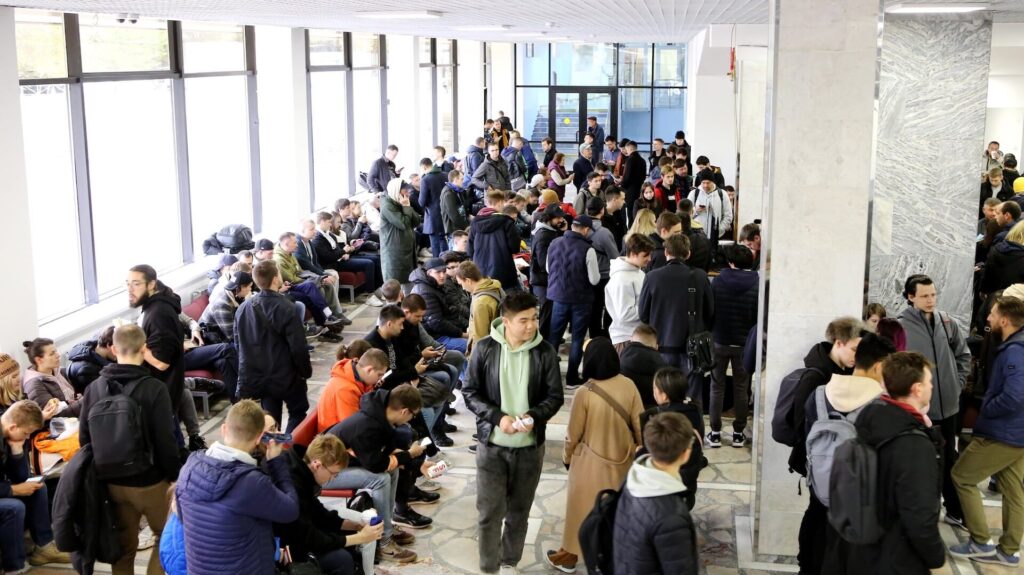Russia and Ukraine at war. Kazakhstan’s economy has to adjust

Today, Nov. 19, marks 1,000 days since the outbreak of war between two former Soviet republics, Russia and Ukraine. Both countries have lost hundreds of thousands of people. Given that the border between Russia and Kazakhstan is the longest in the world (7,600 kilometers), the war has had a significant impact on Kazakhstan.
Sberbank was acquired by the Qataris; BCC bought Alfa-Bank, and VTB has remained the same.
Before Feb. 24, 2022, when the Russian military crossed the Ukrainian border, three Russian banks operated in Kazakhstan’s banking sector: Sberbank, Alfa-Bank, and VTB. After the war broke out, the Office of Foreign Assets Control under the U.S. Department of the Treasury introduced sanctions against the Russian financial sector, which was a bombshell for the Kazakhstani subsidiaries of the Russian banks as well.
In September 2022, the national holding Baiterek acquired Sberbank in Kazakhstan for zero tenge. However, the bank transferred $261 million in dividends for 2021 to its parent company in Russia. From that moment, the holding tried to persuade U.S. authorities to lift their sanctions on Sberbank Kazakhstan to sell it to a foreign investor. The bank was renamed Bereke, and after rebranding, all the sanctions were lifted in March 2023. Eventually, Baiterek managed to sell the bank to Qatari Lesha Bank for $130.9 million.
Alfa-Bank also left the Kazakhstani market. Sources familiar with the matter told Kursiv.media that several financial institutions wanted to acquire Alfa-Bank’s subsidiary in Kazakhstan. Bank CenterCredit (BCC) was authorized by the regulator to finalize the deal. In May 2022, the bank acquired the asset for $100.6 million. The new owner conducted rebranding and renamed the bank Eco Center Bank. After working for five months, the bank ceased to exist as an independent entity and became part of its parent company, BCC.
As a result, VTB has become the only Russian bank that continues to operate in Kazakhstan. As VTB Group CEO, Andrey Kostin, said in 2022, the bank considered its business in Kazakhstan very promising.
Card tours
In March 2022, international payment systems Visa and Mastercard stopped their operations in Russia, cutting off Russian financial organizations from their services. The move also hit thousands of Russians whose banking cards stopped working abroad. In the same month, Russian tour operators started to organize so-called «card tours» to Kazakhstan, Uzbekistan, Armenia and Kyrgyzstan. Some companies offered customers the option to open a card remotely. In response to these card tours, Kazakhstan restricted foreigners from applying for banking cards, leaving this option only for those who were legalized in Kazakhstan. The measure was taken to lower the risk of secondary sanctions.
Money transfers between Kazakhstan and Russia
Both Kazakhstanis and Russians use services such as Zolotaya Korona, Western Union and MoneyGram, among others, to transfer money between the two countries. In 2022, Kazakhstanis transferred $393.9 million (697,100 transactions) to Russia and received $718.3 million (829,800 transactions) from Russia. In 2023, the situation changed — Kazakhstanis sent $411 million (1.1 million transactions) to Russia and received $217.9 million (535,000 transactions). This trend has continued this year, with Kazakhstan transferring more money to Russia than it receives. Over the first nine months of 2024, Kazakhstanis sent $347.7 million (857,800 transactions) and received just $98.8 million (257,100 transactions).
The vast majority of international money transfers have been conducted through Zolotaya Korona (80%). In September 2024, the number of transfers dropped compared to data from August due to the unwillingness of some Kazakhstani banks to work with the service. This followed U.S. sanctions against the Center of Financial Technologies, the developer of Zolotaya Korona. Currently, three major banks — Jusan, Halyk, and Bank RBK — don’t work with Zolotaya Korona, while Freedom Bank, Forte, Bereke, BCC, Eurasian Bank, Altyn Bank and Nurbank still support the service.
This spring, some Russian media outlets reported delays in money transfers from Russia to Kazakhstan, as many commercial banks in Kazakhstan have been trying to avoid the risk of secondary sanctions. In November 2024, the RBC news agency reported that Kazakhstani banks extended deadlines for payments made by Russian businesses. Sources claimed that the process of depositing money into accounts may now take up to two months. Kazakhstani banks have adopted a more rigorous compliance and due diligence process to mitigate sanctions risks.
Kazakhstani companies under sanctions
Kazakhstani companies have been targeted by sanctions from the U.S., the EU, Japan, the U.K. and Ukraine. Several companies were sanctioned, including Elem Group, Da Group 22, SberVostok, KBR-Tekhnologii, Kazstanex LLC, Zapchasttrade, Stanex Group, Rabadaziya, TawKz LLC, GDK Baimskaya, ITC Astana and Tynys. These companies, established by Kazakhstani and Russian citizens, were involved in the supply of high-demand goods to Russia, retail trade, and the trade of bearings, spare vehicle parts, welding equipment, machine building, and aviation components.
In May 2024, the OFAC added GDK Baimskaya to its sanctions list. U.S. authorities blocked the company’s banking accounts and banned American residents from cooperating with it. The company holds a license for the production of metals and porphyry copper ore within the Baimskaya deposit. In 2018, the company was acquired by Kaz Minerals from Aristus Holdings Limited, which is controlled by tycoons Roman Abramovich and Alexander Abramov, for $900 million. In 2023, Kaz Minerals sold GDK Baimskaya to Trianon Limited, another Kazakhstani company registered with the Astana International Financial Centre and controlled by Vladimir Kim and Oleg Novachuk.
In 2023, Ukraine imposed sanctions against two Kazakhstani companies: ITC Astana and Tynys. Tynys is a former subsidiary of Kazakhstan Engineering, currently involved in machine building and aviation. The company exports about half of its goods (spare parts for aircraft) to Russia. In turn, ITC Astana specializes in the trade of welding equipment and is an official representative of ITC Ural, a Russian producer of welding equipment.
From Urals to KEBCO and oil supplies to Germany
According to the ru.investing.com website, from the start of the war until March 1, one barrel of Brent Crude cost $95.48, peaking at $120.8 per barrel in June 2022. Oil prices then declined, reaching $85.28 per barrel by January 1, 2023, and $77.31 by January 1, 2024. At the time of writing, Brent futures for the January supply were priced at $71.04 per barrel.
Oil prices are a critical factor for the Russian war machine, as oil and gas revenue accounted for 31.7% of Russia’s federal budget from January to September 2024, compared to 28.3% during the same period last year, according to Vedomosti. Over the first nine months of this year, oil and gas revenue rose by 150%, surpassing 8.3 trillion rubles ($82.5 billion).
Russia does not produce Brent crude but instead relies on seven other types of oil, including Urals. When the war began, Kazakhstan shifted from Urals to its own variety of oil, called KEBCO, to avoid the risk of sanctions.
Kazakhstan exports oil to Italy, the Netherlands, China, South Korea, the U.S., India, Greece, Israel, Singapore, Turkey, Romania and Germany. According to KazMunayGas, in 2022, Germany approached Kazakhstan with a request to begin oil supplies via the Druzhba pipeline. Although this route had not been used before the war, as of July 2023, Kazakhstan was supplying 100,000 tons of oil to Germany through this pipeline. This year, Kazakhstan is expected to export 1.2 million tons via this route.
In April 2024, some media outlets reported that Kazakhstan was considering the construction of a new pipeline along the bottom of the Caspian Sea. The country may also increase trans-Caspian oil shipments to seven million tons, matching the capacity of the port of Aktau.
The inflow of relocants and their impact on the housing market
Over the first year of the war, more than three million people fled Russia to Kazakhstan. On September 21, 2022, Russian President Vladimir Putin signed a mobilization law that prompted tens of thousands of young Russians to leave the country. The massive inflow of these individuals into Kazakhstan significantly impacted the local housing market, more than doubling rent prices.
In 2022, the cost of renting in Kazakhstan rose 2.4 times, from 1,928 tenge ($3.88) per square meter to 4,678 tenge ($9.42). In 2023, rent for one square meter cost 4,871 tenge ($9.81), while by October 2024, the price dropped slightly to 4,497 tenge ($9.06). A different trend was observed in Almaty and Astana, where rental prices surged by 65% and 25% respectively from 2021 to October 2024, reaching 5,446 tenge ($10.97) in Almaty and 4,623 tenge ($9.31) in Astana. According to Dmitry Turaev, Consul General of Russia in Almaty, as of February 2024, there were between 50,000 and 80,000 relocants in Kazakhstan out of the 400,000 Russians fleeing mobilization. The Bell reported a similar estimate, with 80,000 Russians staying in Kazakhstan.

